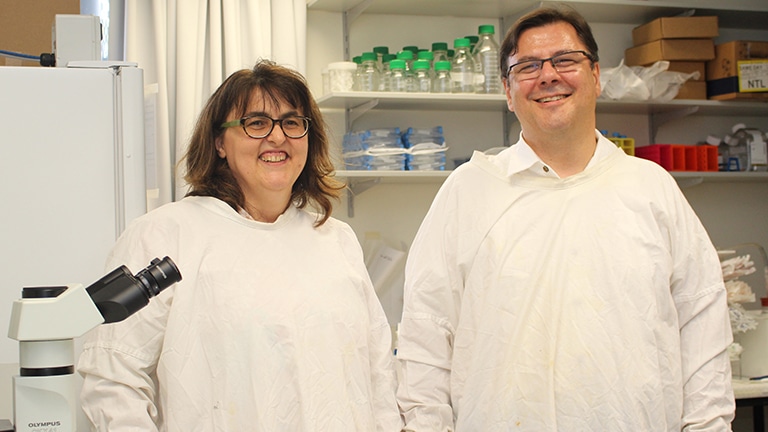
Working with an eminent scientific team that included Nobel Laureate Dr Eric Kandel, dementia researchers from the University of Newcastle have made a significant breakthrough in understanding key mechanisms involved in Alzheimer’s disease.

Working with an eminent scientific team that included Nobel Laureate Dr Eric Kandel, dementia researchers from the University of Newcastle have made a significant breakthrough in understanding key mechanisms involved in Alzheimer’s disease.
People afflicted with Alzheimer’s disease develop progressive shrinking of the brain and memory impairment. The abnormal accumulation of peptides called Amyloid-beta is thought to trigger a toxic cascade that ultimately kills nerve cells in the brain of Alzheimer’s patients.
Associate Professor Estelle Sontag and Dr. Jean-Marie Sontag from the UON School of Biomedical Sciences and Pharmacy worked closely with the Taub Institute for Research on Alzheimer’s Disease and the Aging Brain at New York’s Columbia University to reveal novel mechanisms of Amyloid-beta toxicity.
The landmark international study, published in the prestigious journal PNAS, showed for the first time that an enzyme called protein phosphatase 2A (PP2A) tightly controls the pathological mechanisms of amyloid-beta.
Significantly, their laboratory modelling found that increased levels of an upstream regulator of PP2A known as LCMT1 can protect against the memory impairment and neuronal toxicity induced by Amyloid-beta. Conversely, inhibition of PP2A increased the sensitivity of brain cells to Amyloid-beta toxicity and worsened memory deficits induced by Amyloid-beta.
Estelle Sontag added “while Amyloid-beta-amyloid is thought to play a central role in the etiology of Alzheimer’s disease, we have only a poor understanding of the mechanisms by which it exerts its pathological effects and induces cognitive decline in affected patients.
“Without this intimate knowledge, it is not possible to design effective and safe therapeutic treatments. In previous studies, our group had already observed that LCMT1 expression is dramatically decreased in Alzheimer’s disease-affected brain regions.
“This correlated with the accumulation of toxic aggregates of Tau proteins, another hallmark of this disorder. These new studies are highly significant because they show for the first time that LCMT1 can also act upstream by directly modulating Amyloid-beta toxicity.”
Dr Jean-Marie Sontag said there were currently no effective treatments or cure for the 353,800 Australians currently living with Alzheimer’s disease and dementia.
“Each week, there are more than 1,700 new cases of dementia in Australia. Our findings suggest that enhancing LCMT1 could counteract the toxicity of excessive Amyloid-beta in Alzheimer’s disease, so targeting LCMT1 could be a novel therapeutic strategy for prevention and treatment.”
Dr Russell Nicholls and Dr Ottavio Arancio from the Taub Institute also worked on the study.
HMRI would like to acknowledge the Traditional Custodians of the land on which we work and live, the Awabakal and Worimi peoples, and pay our respects to Elders past and present. We recognise and respect their cultural heritage and beliefs and their continued connection to their land.

Hunter Medical Research Institute
We’re taking healthy further.
Locked Bag 1000
New Lambton
NSW, Australia, 2305



This site is protected by reCAPTCHA and the Google Privacy Policy and Terms of Service apply.
Copyright © 2024 Hunter Medical Research Institute | ABN: 27 081 436 919
Site by Marlin Communications
